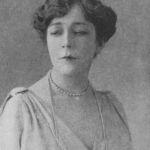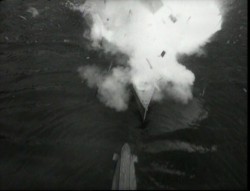In late August 1940, as the aerial battle over Britain intensified, the Manchester Guardian published a short, light-hearted account of how the war was affecting a cathedral town in the provinces. For example, a dogfight takes place overhead, and shelterers scatter outside to pick up bullet casings for souvenirs; four of the enemy raiders are shot down within view of the firewatchers on the cathedral roof. The odd thing about this is that the town didn’t exist: it was Barchester, the setting of a famous series of novels by Anthony Trollope.
The article’s author, B., sketches the part played by Barchester in the last war and the present one:
In the past Barchester has always fought its wars by proxy. The dignitaries of its historic past, the Proudies, the Arabins, and the Grantleys, followed the fortunes of the Army in the newspapers with a highly vociferous but none the less detached regard. Their successors of 1914 have not yet found a chronicler, but they too, though they wrought manfully in the work of caring for the thousands of troops round about and though most of them suffered the loss of a son, regarded wars as highly distressing events which happened somewhere else. The serene security of Barchester itself remained unquestioned and undisturbed even through that ordeal.
To-day it is undisturbed no longer, and if Bishop Proudie and his redoubtable wife and chaplain were living now they would hardly believe themselves to be in the same world. The Bishop would be required to take himself to shelter on an average twice a day. His wife would make his life even more of a burden, for her temper, never very equable, would not survive the strain of continually interrupted meals. Mr. Slope, like his successor of to-day, would be drafted firmly into the A.F.S., be forced to put on a scratchy uniform at a most undignified speed, and then to work under the firm and fluent direction of one of the cathedral vergers. 1
It’s very dryly done, and I doubt I would have picked it up except that I’ve read Framley Parsonage. I’m sure that many more people were familiar with Trollope then than now, but even so some Guardian readers were probably left wondering why they should care about this town they’d never heard of where, which seemed no different than any other, and where nothing much was happening. Perhaps that was the point, that as a nowhere it stood for everywhere:
That is the limit of our excitement so far. [Barchester] is an oasis in a desert of alarm signals which have become so frequent and so uneventful that most of us now carry a book about us to read during the next raid.2
I can’t help but wonder what happened to other non-existent British places during the war. Was 221B Baker Street blitzed? Did Totleigh Towers get taken over as a rehabilitation hospital for wounded airmen? Was Avalon tilled by the Women’s Land Army? Much research remains to be done.
![]() This work is licensed under a Creative Commons Attribution-NonCommercial-NoDerivatives 4.0 International License.
Permissions beyond the scope of this license may be available at http://airminded.org/copyright/.
This work is licensed under a Creative Commons Attribution-NonCommercial-NoDerivatives 4.0 International License.
Permissions beyond the scope of this license may be available at http://airminded.org/copyright/.





Certainly, many more people would have been familiar with Trollope than today, and the Guardian’s readership would, in broad terms, have been better read than the man on the Clapham omnibus. Even those who hadn’t read Trollope would have spotted the allusion straight away. I’d be prepared to wager that in 1940 less than 1 in 100 of the Guardian’s readers wouldn’t have immediately recognized Barchester. It was the sort of cultural background that people held within them at the time, rather like knowing where Albert Square is.
I suspect that many readers would – rightly or wrongly – have identified Barchester with Winchester, though from the whimsical tone of the article I can’t imagine anybody taking it for reportage.
Cloisterham got hit pretty hard, though the cathedral still stands. So does Satis House. (Which is an odd thing, as Dickens himself burnt it down.)
Meanwhile, apparently, time travellers from a future Oxford were all over Barchester cathedral looking for a bit of furniture.
http://www.amazon.com/Blackout-Connie-Willis/dp/1596063181/ref=sr_1_3?ie=UTF8&s=books&qid=1278511007&sr=8-3
A newspsper cutting to hand:
Casterbridge Blitzed in Literary Baedeker Raid.
Hardy Natives of Wessex find Mayor Jude Tessted on Return from the Madding Crowd
Sorry. But not very!
Neil:
Now, if you’ve said Ramsay St instead of Albert Square, I’d have known what you meant …
You’re probably right about it being common cultural knowledge, though my sense is that Trollope was read less often than Dickens or Twain, say. The placement of the article on what passed for the ‘light’ news page (photo section, hints for homemakers) might have confused things, paradoxically: a whimsical tone was not that unusual there even when discussing real events.
Erik:
I was just talking to somebody the other day about Connie Willis’ Blitz stuff. Seems her short stories might be better.
JDK:
Obscure … but not very!
Ramsay St, Albert Square, Ambridge . . .
I only wish I could honestly claim I’d never heard of any of them. Doubtless some of the Guardian’s readers felt like that about Barchester, Cloisterham, Casterbridge, Middlemarch, Villette etc.
Come to think of it, Villette would have been a bit knocked around in both World Wars. Probably more in the first? And Montsou must have been just about obliterated.
Do Villette and Casterbridge really count? They’re just re-badged versions of real existing places. So real in fact that I was born in one of them. Ambridge and Barchester are different. I’m sure that Walter Gabriel did a bit of black market dealing in the 1940s, and any year now, Nigel’s going to discover that an Allied aircraft crashed into Lackey Hill, and decide to memorialise the crew, despite Lizzie’s sighing.
Incidentally, Julian Glover in the Guardian has taken up the issue of “WW2 memorials, enough already”: http://www.guardian.co.uk/commentisfree/2010/jul/12/have-centotaph-dont-need-more-war-memorials
JG tends towards the reactionary end of the Grauniad’s commentators.
Well, generally to some degree they are all ‘re-badged versions of real existing places’ or amalgams, unless it’s science fiction?
Thanks for the pointer to the Grauniad article. Good provocative stuff.
Ambridge doesn’t replace anywhere: it exists in a fictional map of England. Borsetshire is created by taking the Gloucesershire / Oxford border and squeezing the one bit west and the other bit east, then sticking it in the gap. Casterbridge, OTOH, is another name for Dorchester.
Yesss, I’m aware of the differences between Oxbridges and the Nonspecific village, and I don’t see it’s of great moment, given they are by definition all fictional versions of real places -singular or amalgamated – to some degree.
It’s all like getting hung up on trying to find 221B because Baker Street exists.
My point was while there are differences, essentially, they are all ‘just’ literary devices to enable a context for the author’s needs, and their locations are not made unrealistic to assist reality the originality of the plot. Once the location actually becomes an original (a Francophone English town, with soft cheeses, say) then it becomes something else – science fiction perhaps…
Once the location actually becomes an original (a Francophone English town, with soft cheeses, say) then it becomes something else – science fiction perhaps…
That would come under the other ‘SF’ – Speculative Fiction, which includes (beside SciFi and Fantasy) Alternate History, and much Horror.
Thanks Errol.
Then we enter the arena of what’s wrong with classifying fiction, apart from ‘good’ or ‘bad’.